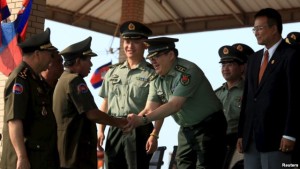
PHNOM PENH, CAMBODIA—Cambodia is strengthening its military ties with China, and analysts say it is likely to continue doing so for the forseeable future.
Cambodian Defense Minister Tea Banh made a five-day trip to China last week, meeting with high-ranking military officials and receiving pledges of assistance from the Chinese military.
In a recent interview, he told the VOA Khmer service that the visit was successful in bringing military cooperation between the countries even closer. That relationship is closer than Cambodia’s military ties with the U.S., he said.
Analysts say Phnom Penh is likely to look more and more to Beijing for support because of growing tensions with its old patron, Vietnam, over border issues.
Cambodia and China have traditionally enjoyed close relations, and they became noticeably closer after 2012 when Cambodia, as host of an Association of Southeast Asian Nations summit, sided with China over the contentious South China Sea issue.
The following year, Beijing provided Phnom Penh with a $195 million loan, which bought 12 Chinese Z-9 military helicopters. In May of this year, China pledged military trucks, spare parts, equipment and unspecified chemicals.
Cambodian Prime Minister Hun Sen has often touted the relationship. During the inauguration of a Chinese-funded road in Kampong Som province last month, he told a group of farmers that Cambodian-Chinese relations were at an all-time high, and that the two were moving toward a “comprehensive” partnership. China’s development fund for Cambodia for 2015 amounted to $140 million, up from $100 million the year before, he said.
Tea Banh defended the bilateral relationship, saying Chinese aid came with no strings attached and that China had never interfered in Cambodian affairs. He declined to disclose how much aid Cambodia would receive from his latest trip.
Benefits for China
Yet analysts warn that China is getting more out of the deal than Cambodia. Chheang Vannarith, a visiting professor at the University of Leeds in England, said China needs Cambodia as a partner in Southeast Asia, where competition is rising.
“The region is full of complicated competition” between China and Japan and China and the U.S., he said. “China takes Cambodia in Indochina and the Mekong region to strengthen its sphere of influence in the Asia-Pacific.”
In the end, he said, Cambodia is playing a riskier game than China. “Once we rely on China so much, we will lose what is called self-determination in foreign policy,” he said.
Paul Chambers, a professor at Thailand’s Chiang Mai University, called China “a growing superpower” that uses Cambodia for influence within ASEAN in what he characterized as a “growing cold war” between Beijing and Washington.
“I believe that Hun Sen has shown himself in the past and present to be a very good balancer among allies,” he said. “Hun Sen will increasingly welcome Chinese defense sector assistance to Cambodia.”
Maintaining balance
Hugh White, a professor of strategic studies at Australian National University in Canberra, told VOA Khmer that the growing military cooperation between Cambodia and China would counter U.S. influence in the region while bolstering Cambodia’s military capabilities.
“We see America trying to develop closer ties with Vietnam, for example, with [the recent] senior Vietnamese visit to Washington,” he said. “China’s willingness to develop stronger defense links with Cambodia is part of this process. However, I doubt that this will go so far as to fundamentally transform Cambodia’s defense posture or sector.”
Last week’s trip by Tea Banh to China came amid an ongoing diplomatic row with Vietnam over alleged border encroachment. The Beijing visit could signal to Vietnam that “China may be willing to support Cambodia in a border dispute with Vietnam,” White said.
This report was produced in collaboration with the VOA Khmer service.
